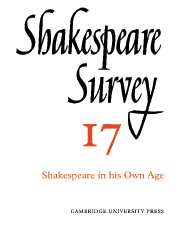Book contents
- Frontmatter
- THE DAILY LIFE
- 1 London and the Court
- 2 Provincial Life
- 3 Sailors and the Sea
- 4 Elizabethans and Foreigners
- 5 Education and Apprenticeship
- 6 The Law and the Lawyers
- 7 London’s Prisons
- PHILOSOPHY AND FANCY
- 8 The Commonwealth
- 9 Dissent and Satire
- 10 Scientific Thought
- 11 Medicine and Public Health
- 12 The Folds of Folklore
- 13 Symbols and Significances
- ART AND ENTERTAINMENT
- 14 Actors and Theatres
- 15 The Printing of Books
- 16 Music and Ballads
- 17 The Foundations of Elizabethan Language
- Notes
- Index
- Plate section
5 - Education and Apprenticeship
Published online by Cambridge University Press: 28 March 2007
- Frontmatter
- THE DAILY LIFE
- 1 London and the Court
- 2 Provincial Life
- 3 Sailors and the Sea
- 4 Elizabethans and Foreigners
- 5 Education and Apprenticeship
- 6 The Law and the Lawyers
- 7 London’s Prisons
- PHILOSOPHY AND FANCY
- 8 The Commonwealth
- 9 Dissent and Satire
- 10 Scientific Thought
- 11 Medicine and Public Health
- 12 The Folds of Folklore
- 13 Symbols and Significances
- ART AND ENTERTAINMENT
- 14 Actors and Theatres
- 15 The Printing of Books
- 16 Music and Ballads
- 17 The Foundations of Elizabethan Language
- Notes
- Index
- Plate section
Summary
Degrees in schools and brotherhoods in cities
Forasmuch as God's glory, his honour, and the wealth public is advanced and maintained by no means more than by virtuous education and bringing up of youth under such as be learned and virtuous schoolmasters, whose good examples may as well instruct them to live well as their doctrine and learning may furnish their minds with knowledge and cunning, [I] have thought it good,... to erect the said Free Grammar School and to provide a reasonable and competent stipend for the schoolmaster of the same...
Preamble to the Statutes of Witton (Chester) Grammar School (1558)For what maketh a nation to be a glorious nation, but that the people are a wise and an understanding people? What is it whereby we come so near unto the Highest, or to that blessed estate from which by our first parents we are so fallen, and to which we must be renewed and restored, if ever we shall inherit again the tree of life, as by true understanding and knowledge, especially if the same be sanctified unto us? Yea, what is it else whereby we excell the beasts, but by this divine reason, with which the more we are enlightened by the spirit of the Lord, through the means of learning, the more we differ, the more we do excel?
John Brinsley, A Consolation for our Grammar Schools (1622)Few peoples have possessed more faith in learning than Englishmen of Shakespeare's age. One of the ironies of history is that the term 'enlightenment' has become associated with an age when this enthusiasm - at least in England-burned less brightly than it had a century and more earlier. Evidence of this devotion to learning exists in profusion. State papers, sermons, letters, account books, works of social and religious criticism, and handbooks for self-improvement all testify to its prevalence. Statements coming from the early sixteenth century and others framed amid the turmoil of civil war show that over the years this ideal maintained a strong hold on the minds of Englishmen.
- Type
- Chapter
- Information
- Shakespeare Survey , pp. 53 - 72Publisher: Cambridge University PressPrint publication year: 1964
- 3
- Cited by

